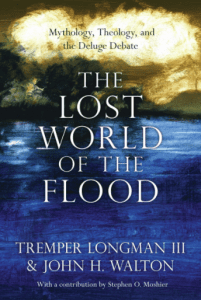 Genesis 1-11 is primeval history and theological history. It plays an important role in the narrative of Genesis. It sets the stage for what is to come … Abraham, Israel, the kingdoms and prophets, exile and return, the front story for the incarnation, crucifixion, resurrection, and ascension of Jesus and now the church. John Walton and Tremper Longman agree that the stories in the primeval history have roots in historical happenings, but the details of the events themselves are of less importance that the use they are put to in the narrative. The stories are rhetorically shaped using figurative language for a theological purpose.
Genesis 1-11 is primeval history and theological history. It plays an important role in the narrative of Genesis. It sets the stage for what is to come … Abraham, Israel, the kingdoms and prophets, exile and return, the front story for the incarnation, crucifixion, resurrection, and ascension of Jesus and now the church. John Walton and Tremper Longman agree that the stories in the primeval history have roots in historical happenings, but the details of the events themselves are of less importance that the use they are put to in the narrative. The stories are rhetorically shaped using figurative language for a theological purpose.
The story of the flood in Genesis 6-9 takes the chaos humankind had made of the world and institutes a restart. “God uses non-order (the waters) to eliminate disorder (pervasive violence) and then reestablishes optimal order (even as he recognizes that disorder remains[Gen 8:21]). ” (p. 118)
Of course, the continuing disorder through human disobedience and violence remains a problem. Neither creation or the flood do-over result in humanity in perpetual union with God. The primeval history with its pattern of disorder, punishment, and grace sets the stage for God’s covenant relationship with Israel. “Genesis 1-11 serves as an essential introduction to the covenant. It explains the need for a covenant and helps put it in perspective to establish what the covenant is all about.” (p. 119).
As we read Genesis with an eye and ear toward the original ancient Near Eastern (ANE) context, we understand more of the intent of the author and the way that the compiler has used the material to make a point. A key observation:
Such a role has some similarity to the literary phenomenon observable repeatedly in ANE literature, where it is common for narratives about primeval time to set the stage for narrated history. If Genesis 12-50 stands as the primary narrated history, which we believe it does, Genesis 1-11 serves the purpose of providing a prologue using illustrations from primeval history. Furthermore, the flood account in the ANE literature if used not only as part of these primeval prologues but also in destruction-restoration contexts that are leading to a new order. In Genesis the new order is represented first of all in the re-creation following the flood, but more importantly in the covenant story that frames the ancestor narratives. (p. 119)
A take-away. Well, my take-away not necessarily John and Tremper’s. Once upon a time I felt that Genesis 1-11 posed a serious problem for Christian faith. Six day creation, young earth, talking snake, ‘magical’ trees, sons of God and daughters of humans mating and producing children, global flood and genetic bottleneck, divine origin of linguistic diversity a mere four thousand or so years ago. Today I don’t worry about this. It doesn’t impact my faith, largely because I no longer see anything inherently wrong with the possibility that the primeval history was re-shaped and re-told to set the stage for the story of Israel. I don’t know how much is ‘history’ and I don’t care. It makes sense that the ancient Israelites could have followed a literary structure common in their culture and, after a doxological opening in Genesis 1, used narratives about primeval time in 2-11 to set the stage for the story of the patriarchs and the covenant relationship with Israel.
I no longer find this inherently at odds with the idea that the Bible is God’s self-revelation preserved for us to tell his story. It doesn’t undermine inspiration or authority. We don’t approach the Bible to separate truth from error. We approach the Bible to understand God and his vision and vocation for us as his creatures.
Certainly there are important historical roots in Genesis 1-11: We believe in God the Father, creator of heaven and earth. We also believe that humans were created for a purpose and with a vocation to be the image of God on earth. We believe that God instituted marriage, that humans have sinned and rebelled against God and that rebellion is a recurring pattern. The broken relationship with God requires correction. God responds to his people in judgment, mercy, and grace. Beyond these? Well let’s focus on more important things.
John and Tremper tend to see more significant historical roots in Genesis 2-11, and they could be right. I just don’t think it matters. It does matter that these chapters set the stage for the covenant relationship of God with Abraham and Israel and ultimately with us.
What do you think?
If you wish to contact me directly, you may do so at rjs4mail[at]att.net
If interested you can subscribe to a full text feed of my posts at Musings on Science and Theology.












